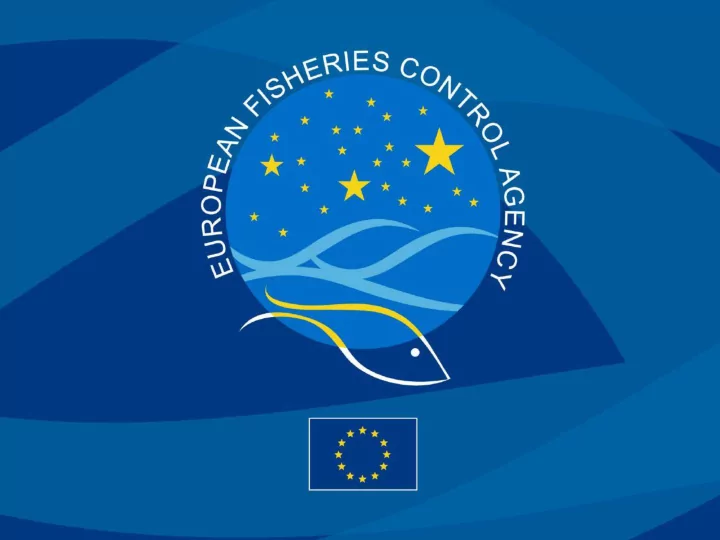

Controlling EU waters effectively: The importance of quality data, information exchange and effective control and monitoring Towards a new EU fisheries control system: How to deliver fully documented fisheries 7 March 2019 Brussels, European Parliament
Setting the scene • Different management measures call for different control and monitoring options • The introduction of LO changes the paradigm from “landing quota” to “catch quota” • JDPs facilitate the exchange of primary fisheries and control data (VMS, ERS, AIS) and provide a solid basis for regional risk management approach • Improved data management framework and possible introduction of REM could ensure a continuous and more effective control and monitoring
Joint Deployment Plans Species covered in 2019 pending the publication of the new SCIP decision
Main JDP features Prioritised Year-round Exchange of Pooling of MS experts Regional Permanent inspections Specific continuous information joint Exchange of deployment Risk data on highest actions for joint on inspection inspectors to Assessment exchange in risk mitigation campaign inspections, means (at sea and Coordination (based on the region categories, on priority with MS sightings and (FPVs, on land) Centre at fleet (VMS, ERS) by target issues concerned assets flights) EFCA segments) vessel lists
EFCA OPV Available for joint operations under JDP coordination / Assist EU under international obligations/ Cooperation in European CG initiatives Facilitates: Effectiveness Level playing field Exchange of best practices
Data exchange in JDPS • Permanent exchange of ERS and VMS, beyond the principles of control reg. • Full regional view, facilitating risk assessment and promoting transparency
Data exchange: a possible way forward • Strategy for data management at EU level: – Manage a central repository of EU MS fishery data (e.g. VMS, ERS, ) and control data (e.g. EIR) with access to MS and COM – Fulfilment of the data related EU obligations under RFMOs and FPA, with a global view of EU fishing activity worldwide – EFCA ideally placed to provide general assistance to COM and MS in the context of data exchange and analysis
REM Technical Working Group • REM TWG created on request of the MS and reinforced by the endorsement of the European Commission. • Working group strictly of technical nature coordinated by EFCA. • Dedicated to the definition of REM systems technical specifications and minimum requirements to ensure standardisation and level playing field is maintained in this area. • The REM TWG considers technical requirements and associated procedures on how REM/CCTV could be best deployed on fishing vessels to provide means to effectively control and enforce the landing obligation at sea.
Technical Specifications: Main topics • Minimum requirements for a standard REM system specified for: • Control box • Cameras (by type) • Sensors • System diagnostics • Related topics covered in the guidelines: • Installation specification: Vessel Monitoring Plan (VMP) • Rules of operation: Logbook recording, catch handling, etc. • Technical aspects of data handling and analysis: Storage, retrieval, analysis software, risk-based selection viewing, etc. • System ownership • Cost estimates
EFCA INTERNATIONAL ACTIVITIES RFMOs (ICCAT, NEAFC, NAFO, Article 30 CFP GFCM, IOC) Compliance with international provisions • JDPs (Coordination, risk…) The Union shall, including through the European Fisheries Control Agency • Support to EU delegation (''the Agency''), cooperate with third • Assistance in cooperation countries and international organisations dealing with fisheries, including RFMOs, to strengthen Third Countries, including SFPA compliance with measures, especially those to combat IUU fishing, in order to • Support to EU Delegation (Norway..) ensure that measures adopted by such international organisations are strictly • Training on request of the Commission adhered to. • IUU evaluation missions • Assistance in cooperation On request • PESCAO project of the Commission
PESCAO 5 years’ project in West Africa Fishery Committee of the West Central Gulf of Guinea (FCWC) EFCA contribution: Support to FCWC and SRFC in the fight against IUU fishing through improved Monitoring, Sub-Regional Fisheries Control and Commission (SRFC) Surveillance at national and regional level EFCA PD 2019 12
Training • EFCA participated in 2018 in 35 training events for National Inspectors, Union inspectors, Third Countries inspectors and other officials • Support to national training programmes: EFCA « step- by-step » methodology for trainers • Training calendar/catalogue • « Pool » of MS trainers • Training manuals • Multilingual e-learning platform • Video tutorials
Training for non-EU countries Assistance to the Commission Medit. (GFCM) countries: • Straight of Sicily pilot project: Algeria, Egypt, Libya, Morocco, Tunisia; • Black Sea: Georgia, Ukraine Western African countries: • 5 years ’ EU -funded project PESCAO: legal support to FCWC and SRFC, training, operational/technical support at national and regional levels
THANK YOU! efca@efca.europa.eu http://www.efca.europa.eu 23 February 2018 15
Recommend
More recommend